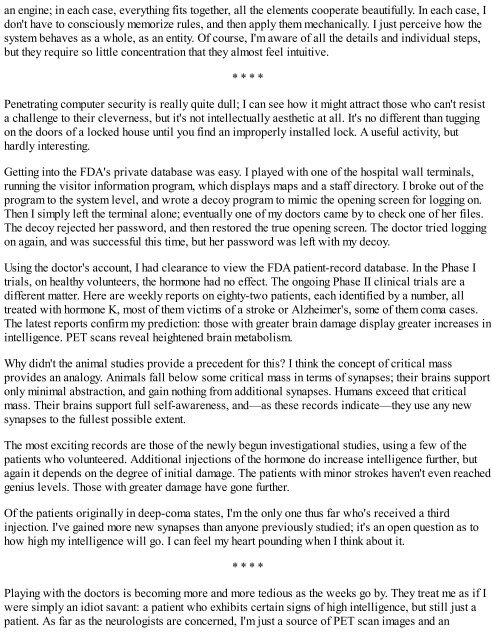Create successful ePaper yourself
Turn your PDF publications into a flip-book with our unique Google optimized e-Paper software.
an engine; in each case, everything fits together, all the elements cooperate beautifully. In each case, I<br />
don't have to consciously memorize rules, and then apply them mechanically. I just perceive how the<br />
system behaves as a whole, as an entity. Of course, I'm aware of all the details and individual steps,<br />
but they require so little concentration that they almost feel intuitive.<br />
* * * *<br />
Penetrating computer security is really quite dull; I can see how it might attract those who can't resist<br />
a challenge to their cleverness, but it's not intellectually aesthetic at all. It's no different than tugging<br />
on the doors of a locked house until you find an improperly installed lock. A useful activity, but<br />
hardly interesting.<br />
Getting into the FDA's private database was easy. I played with one of the hospital wall terminals,<br />
running the visitor information program, which displays maps and a staff directory. I broke out of the<br />
program to the system level, and wrote a decoy program to mimic the opening screen for logging on.<br />
Then I simply left the terminal alone; eventually one of my doctors came by to check one of her files.<br />
The decoy rejected her password, and then restored the true opening screen. The doctor tried logging<br />
on again, and was successful this time, but her password was left with my decoy.<br />
Using the doctor's account, I had clearance to view the FDA patient-record database. In the Phase I<br />
trials, on healthy volunteers, the hormone had no effect. The ongoing Phase II clinical trials are a<br />
different matter. Here are weekly reports on eighty-two patients, each identified by a number, all<br />
treated with hormone K, most of them victims of a stroke or Alzheimer's, some of them coma cases.<br />
The latest reports confirm my prediction: those with greater brain damage display greater increases in<br />
intelligence. PET scans reveal heightened brain metabolism.<br />
Why didn't the animal studies provide a precedent for this? I think the concept of critical mass<br />
provides an analogy. Animals fall below some critical mass in terms of synapses; their brains support<br />
only minimal abstraction, and gain nothing from additional synapses. Humans exceed that critical<br />
mass. Their brains support full self-awareness, and—as these records indicate—they use any new<br />
synapses to the fullest possible extent.<br />
The most exciting records are those of the newly begun investigational studies, using a few of the<br />
patients who volunteered. Additional injections of the hormone do increase intelligence further, but<br />
again it depends on the degree of initial damage. The patients with minor strokes haven't even reached<br />
genius levels. Those with greater damage have gone further.<br />
Of the patients originally in deep-coma states, I'm the only one thus far who's received a third<br />
injection. I've gained more new synapses than anyone previously studied; it's an open question as to<br />
how high my intelligence will go. I can feel my heart pounding when I think about it.<br />
* * * *<br />
Playing with the doctors is becoming more and more tedious as the weeks go by. They treat me as if I<br />
were simply an idiot savant: a patient who exhibits certain signs of high intelligence, but still just a<br />
patient. As far as the neurologists are concerned, I'm just a source of PET scan images and an

















